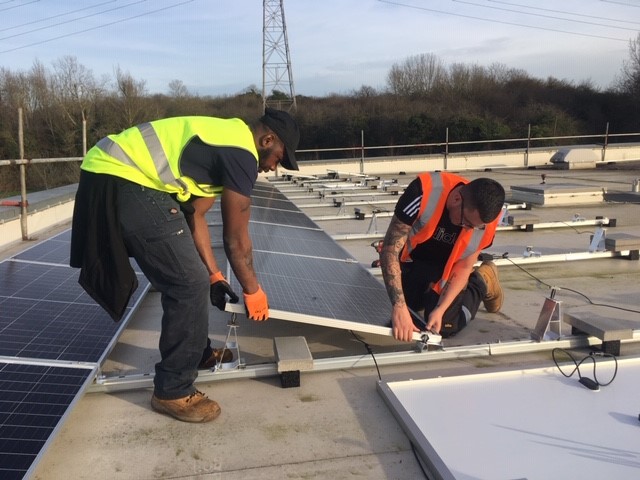
Image: Joju Solar.
Why is it so easy to complicate the rules for solar panel projects, just when we so urgently need to encourage them? At the same time it seems almost impossible to require renewables on new buildings (although the EU is having a go) judging by most of what we see being built today. Still harder, to ensure that they remain switched on and working.
We are rightly wary of MPs - or local councillors - being involved in businesses in which they may have influence in their role as law makers. Even as an unelected member of the Environment Scrutiny Committee in my local authority I had to leave the room whenever the topic of renewable energy was being discussed. Yet we think nothing of standards being written by the industries that stand to benefit from them.
There are good reasons for them to be involved of course. They are the experts. And standards are, by legal definition, only voluntary. Or at least they start life that way. But sooner or later, if they are useful, they may be required by customers, or even mandated by legislation (sometimes with a get-out that other means of compliance are available, in theory). Standards writers will ‘consult’ the public, but are more interested in their obligations to try to keep in line with international standards (and changing ‘maximise’ to ‘maximize’).
This matters. Since the Magna Carta it has been accepted as fundamental that laws should be created democratically and promulgated widely. Standards which morph to become law are not, at that point, reopened to public scrutiny. Some standards bodies are more open than others. ETSI, set up initially to foster the GSM phone system in Europe, publishes everything freely. Most standards bodies are less transparent and charge what they like for the finished article - there is an ongoing court case in Brussels on this.
The publications become an industry of their own and are frequently revised. BS7671 is almost obligatory for household electrics and yet it costs hundreds of pounds to keep up to date. Equipment standards cost even more, presenting a barrier to market entry for entrepreneurs.
It is not only formal standards that change their coat in this way. For solar installers the IET PV Code of Practice (CoP) is a useful and expertly written (if over long) guide. Except that since it was written is has become quasi-mandatory for MCS installations. Of course MCS is now voluntary. But you only have to have one customer insist on it (perhaps because the supplier they wish to sell power to in turn requires it) and all your projects must then comply. So it should now be free.
The IET is now running a public consultation on a revision of the Code of Practice, ostensibly to be brought in line with this year’s changes to BS7671. There is no reason why they need to be identical - after all the CoP is slightly ‘less mandatory’ than BS7671, the latter focusing on safety rather than broader quality issues. Surge Protection and EMC is one significant area of change. But it has to be remembered that internationally equipment standards vary. Historically equipment in the USA has not been required to be immune to interference in the same way as in Europe, so one would not expect the system standards to be the same either.
Installers and customers are woefully underrepresented in the groups writing these codes of practise and should comment on the draft if they have a view. It is even debatable if there are enough changes needed to warrant a revision at all. But if there is to be one it is also an opportunity to remove any superfluous text or excessive regulation, especially now that compliance is a requirement for MCS projects.
One section that might deserve scrutiny is the ‘Earth Fault Alarm.’ On the basis that the product standard for inverters (the title given in the document is incorrect by the way) requires a remote earth fault alarm feature this has been taken to imply that the feature must be used in all installations. This surely extends the remit of the product standard to system design and use. In social housing PV systems it is often the case that the tenants’ internet is intentionally not used by the solar provider, and there may not always be mobile coverage, even if remote monitoring is desirable. Moreover, transformerless inverters are required to shut down in the event of an earth fault.
Rule one of standards should be that they are as short as possible, but no shorter.
